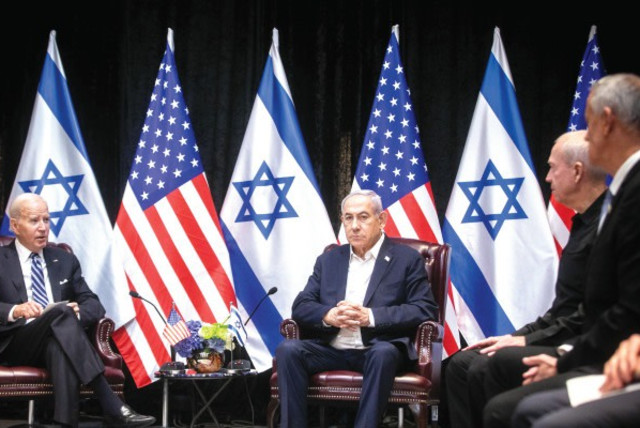Understanding America’s U-turn on Israel’s military operation in Gaza - opinion

In considering the potential future scenarios between the US and Israel regarding actions in Rafah and the broader Israeli-Palestinian conflict, there are at least two scenarios.
Five months after the Israeli military operation began in response to the Hamas attack on October 7, a palpable shift in American public opinion and media coverage unfolded, signaling a reevaluation of the complex geopolitical dynamics at play.
Initially, Operation Swords of Iron garnered widespread support within the United States, viewed through the lens of Israel’s right to defend itself against external terrorist threats. The two main goals were to ensure the destruction of Hamas (and although this was not officially announced, also of other terrorist groups in the Gaza Strip), and the release of the hostages taken by Hamas. This narrative, heavily propagated by mainstream media, emphasized the operation as a necessary response to immediate security concerns.
As weeks turned into months, a more critical examination of the military operation emerged. A pivotal factor in this shift was the humanitarian impact of the operation. Social media and so-called independent journalists and influencers, fueled by Qatari and Iranian propaganda, served as a counter-narrative to the initial pro-Israel coverage. This caused a broader section of the American public to question Israel’s motives and policies, prompting considerations in the highest echelons of power of the complexities involved in such operations.
Biden’s calculated caution and Schumer’s unprecedented critique
Introducing a complex layer to the long-standing alliance between the United States and Israel, the Biden administration developed a more nuanced response to Israeli military actions in Gaza, peaking with Senator Chuck Schumer voicing an openly critical stance toward Prime Minister Benjamin Netanyahu.
As the IDF military campaign raged on, the Biden administration changed its course, warning Jerusalem against escalating operations in the Gaza Strip in an approach that sought to balance support for Israel with international humanitarian concerns. This stance, however, contrasted starkly with Schumer’s scathing critique of Netanyahu, branding the prime minister a significant obstacle to peace. Schumer’s call for new leadership was a remarkable departure from traditional US rhetoric, signaling a seismic shift in the Democratic Party’s perspective, and underscoring deepening fractures in US-Israel relations.
Despite the dire warnings of President Joe Biden, Netanyahu approved a military operation in Rafah – and here’s one reason why: In February, the IDF undertook a daring operation in Rafah, successfully rescuing two hostages held there by Hamas. For Netanyahu, this was solid proof that you can’t fight Hamas and rescue hostages if there’s still a place for them to hide.
The domestic angle: Electoral pressures and the pursuit of peace
Compounding the complexity of US foreign policy are the domestic political pressures weighing heavily on the Biden administration. With an electorate increasingly focused on internal issues, there is a palpable push to minimize overseas entanglements and prioritize domestic challenges. This internal focus suggests that the administration’s pursuit of peace in the Middle East is not only a matter of international diplomacy but also a response to domestic electoral demands for a shift away from foreign policy quagmires.
The US desperately wants all conflicts in the Middle East to be reduced as quickly as possible. According to most polls, the American electorate do not want the US involved in conflicts in other countries. This includes Iraq, Afghanistan, Saudi Arabia, and Israel, as well as Ukraine. The US is trying to disengage from countries in conflict, or stay with the minimum possible presence.
The American dream is to connect Israel and Saudi Arabia, tie them to each other in a normalization agreement, and ideally make money from the union. This is not only the position of Biden and the Democrats. It is also the position of Republican presidential contender and former president Donald Trump, who is an even greater isolationist and does not like intervening and spending public money unless it’s absolutely necessary.
However, the protracted Israeli operation was the perfect opportunity for the US to combine an aid package to Ukraine and Israel, while reducing the amount of aid to both. At the same time, shares of American defense companies continued to show growth, and American technology and venture capital companies are buying up Israeli R&D centers and acquiring start-ups at a much better price than before October 2023.
As the world watches the unfolding narrative of US-Israel ties in the context of the broader Middle East conflict, it is clear that we are at a critical juncture. The dramatic rescue in Rafah, Schumer’s bold rebuke, and the Biden administration’s diplomatic tightrope act together paint a picture of a complex and evolving landscape.
Schumer’s call for new leadership in Israel, juxtaposed with a reassessment of international strategies toward the Israeli-Palestinian conflict, suggests that the path to peace may require not only diplomatic ingenuity but also a willingness to confront uncomfortable truths and recalibrate long-standing policies.
A good Israeli politician has always known how to delicately maneuver between the green lights and red lines. Indeed, Netanyahu has been good in the past. But now it seems like he has limited options. In considering the potential future scenarios between the US and Israel regarding actions in Rafah and the broader Israeli-Palestinian conflict, there are at least two scenarios, each with its own set of implications.
Scenario 1: Israel proceeds without heeding the US
If Israel decides to proceed with a major military operation in Rafah without aligning with the concerns expressed by the US, this could lead to several outcomes. One possible consequence could be increasingly strained diplomatic relations between Israel and the US. While outright US sanctions against Israel might be an extreme outcome given the strong historical alliance between the two nations, there could be more subtle forms of diplomatic distancing, such as reduced diplomatic support at the United Nations or a reevaluation of financial and military aid, and a cancellation of aircraft and anti-missile supplies. This scenario might also feed international scrutiny and criticism of Israel, potentially leading to heightened tensions in the region. Netanyahu would again be blamed, if not for betraying the sacrifices of the soldiers who fell in Gaza, then for rising casualties. The human cost, including potential increases in civilian and military casualties, could further polarize opinions within Israel and internationally. Netanyahu might face significant political and moral accountability, both domestically and globally, as a result of this course of action.
Scenario 2: Israel aligns with US recommendations
Conversely, Israel could decide to halt its military campaign in Rafah and back down on its approach to the Hamas threat, and following US recommendations, emphasize humanitarian concerns for the population of Gaza. This would strengthen bilateral ties, ensuring continued US support in international forums, as well as military aid. This course could be a harder one, especially after Israel hastened to declare that it is not a banana republic. However, it is still possible to reverse the decision to carry out the military operation in Rafah – for example, under the pretext of a deal to release the hostages. However, Hamas is apparently in no hurry to make a deal and is playing for time, perhaps to worsen Netanyahu’s position. This approach could be perceived within Israel as being overly cautious or yielding to international pressure, potentially emboldening Hamas and similar groups. Critics argue that this could lead to a resurgence of terrorist attacks against Israel. The challenge would be to strike a balance between military effectiveness, the protection of civilian lives, and diplomatic considerations.
IN BOTH scenarios, the long-term implications for Israel’s security, regional stability, and international relations are significant. The decisions made by the Israeli leadership in response to these challenges will likely have lasting effects on the geopolitical landscape of the Middle East. Navigating these complex dynamics requires a careful balancing act and weighing immediate security needs against the broader objectives of peace, stability, and international cooperation.
Israel has already shown weakness to the world. Internal protests were splitting the country before October 7 over legal reform, and although the nation came together for a few months after the Hamas attack, new protests against the government and protests against the release of thousands of terrorists for an unknown number of living hostages are threatening this unity.
Netanyahu is definitely not one to give up easily. His position is shaky inside the country, and he definitely does not want an inglorious end. Hemmed in on all sides, he is forced to play all-in. And by playing all-in, some experts predict a potential Israeli attack on Hezbollah or even on Iran.
The White House may try to exacerbate internal processes in Israel. Some cite the example of the US inviting War Cabinet Minister Benny Gantz to a recent meeting with US Vice President Kamala Harris, bypassing Netanyahu, in order to push for the collapse of the current Israeli government and bring in a more moderate government.
A new report by the US Office of the Director of National Intelligence (ODNI) contains direct hints that a rebellion against the current government could be approved by the White House. “Netanyahu’s viability as leader, as well as his governing coalition of far-Right and ultra-Orthodox parties that pursued hardline policies on Palestinian and security issues, may be in jeopardy,” it states. “Distrust of Netanyahu’s ability to rule has deepened and broadened across the public from its already high levels before the war, and we expect large protests demanding his resignation and new elections. A different, more moderate government is a possibility.”
As tensions simmer and the global community watches closely, the decisions made by Israel’s leadership, in concert or in conflict with the US, will not only determine the immediate future of Israeli-Palestinian relations but also shape the landscape of international relations in a volatile and critically important part of the world. The quest for a durable peace in the Middle East, while fraught with challenges, remains a pivotal goal that demands the concerted effort of all stakeholders, guided by principles of justice, respect for sovereignty, and the protection of human rights.■
The writer is a journalist, publicist, and enthusiast of religion and foreign affairs, with a primary focus on the Middle East and Central Europe. Leonid Baratz baratsleonid@gmail.com
Jerusalem Post Store
`; document.getElementById("linkPremium").innerHTML = cont; var divWithLink = document.getElementById("premium-link"); if (divWithLink !== null && divWithLink !== 'undefined') { divWithLink.style.border = "solid 1px #cb0f3e"; divWithLink.style.textAlign = "center"; divWithLink.style.marginBottom = "15px"; divWithLink.style.marginTop = "15px"; divWithLink.style.width = "100%"; divWithLink.style.backgroundColor = "#122952"; divWithLink.style.color = "#ffffff"; divWithLink.style.lineHeight = "1.5"; } } (function (v, i) { });

